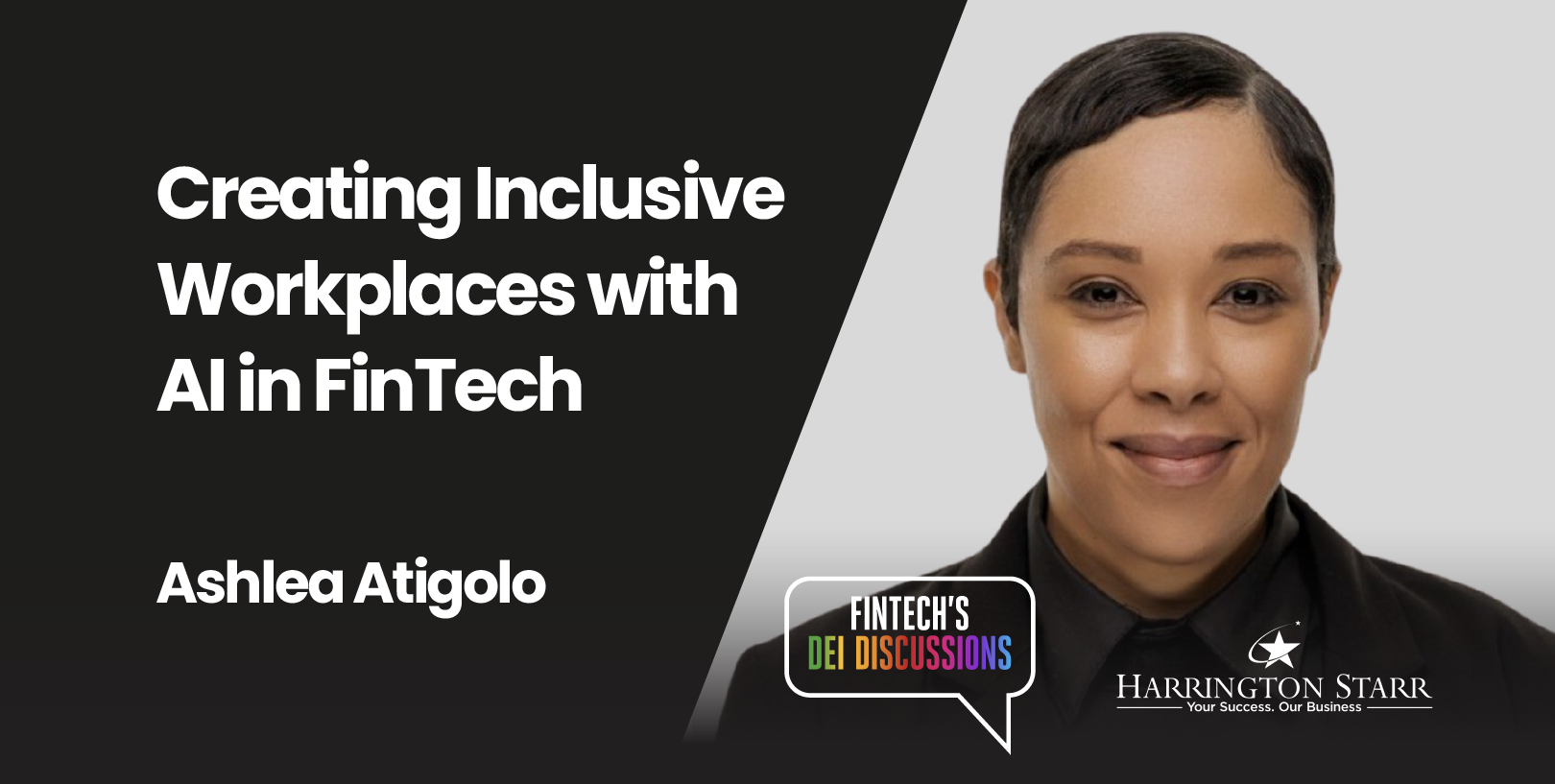
Exploring the Power of AI in FinTech
In the latest episode of FinTech's DEI Discussions, Nadia Edwards-Dashti, the host of the podcast and Chief Customer Officer at Harrington Starr, sits down with Ashlea Atigolo, Founder of INATIGO and Finley AI, to discuss the transformative potential of Artificial Intelligence (AI) in the financial technology sector. This fascinating conversation sheds light on how AI is revolutionising financial services, its impact on employee productivity, and the importance of creating inclusive, diverse environments to fully unlock the benefits of this cutting-edge technology.
Ashlea’s journey as an entrepreneur and tech leader is both inspiring and insightful, especially for those in the FinTech sector. From humble beginnings in wealth management to pioneering a generative AI company, Ashlea offers a unique perspective on the evolution of AI technology and its growing importance in driving innovation in financial services. Throughout the episode, Ashlea shares how her company, INATIGO, is leveraging AI to help financial services firms become more efficient and inclusive. As the conversation unfolds, Ashlea and Nadia explore key areas such as the importance of upskilling in the age of AI, how businesses can stay ahead in a rapidly evolving technological landscape, and how inclusive practices can drive smarter business outcomes.
The Evolution of AI in Financial Services
One of the most compelling parts of the conversation focuses on the evolution of AI in financial services. Ashlea explains that while AI itself is not a new technology, the way it is being utilised, especially through conversational AI and generative AI, is dramatically changing the way financial firms operate. These new forms of AI technology, which include tools like Siri, Google Assistant, and Alexa, have paved the way for more advanced applications in the financial sector. Ashlea provides a clear example of how INATIGO’s journey began in the AI space, initially focusing on research to explore the potential of conversational AI. She reflects on the time when she and her team first encountered this groundbreaking technology and recognised its potential to transform the financial services industry.
What started as a research-driven initiative has since evolved into a thriving AI company that develops innovative solutions for financial firms. The company’s flagship product, Finley AI, is a financial AI agent and API that helps firms enhance their productivity and efficiency by leveraging the power of generative AI. Ashlea shares that, although AI has been around for years, it wasn’t until recent developments in conversational AI and generative AI that the technology truly began to gain traction in the financial services sector. This shift in the industry’s approach to AI is opening up new opportunities for businesses and creating a surge of interest in adopting AI-powered solutions to improve operational efficiency and customer service. Ashlea notes that, especially since 2022, there has been a marked increase in the number of financial firms exploring the potential of AI, highlighting a clear change in industry mindset.
Generative AI: A Game Changer for Financial Services Productivity and Efficiency
As the conversation delves deeper into the application of AI, Ashlea explains how generative AI is transforming productivity in the financial services sector. She emphasises that AI is not designed to replace employees, but rather to empower them by streamlining tedious tasks and enabling them to focus on more strategic, high-value work. By automating repetitive and time-consuming processes, generative AI allows employees to work more efficiently and effectively, ultimately improving the overall performance of the firm.
In this context, Ashlea addresses a common misconception about AI—namely, the fear that AI will replace human workers. Instead, she asserts that it is the people who embrace and effectively use AI who will drive success. The real concern for businesses is not whether AI will take over jobs, but whether their employees are equipped with the skills to use AI effectively. Companies that fail to upskill their teams to work alongside AI risk being left behind, while those that embrace AI as a tool to empower their workforce will see tangible improvements in both employee satisfaction and business performance.
Ashlea also touches on how AI can enable businesses to tap into new markets by increasing efficiency. For example, by using AI to automate processes, firms can reduce the time spent on administrative tasks, allowing them to allocate more resources to business development and client acquisition. This shift allows businesses to scale more rapidly and achieve better returns on investment, ultimately contributing to long-term growth and success.
The Importance of Upskilling and Reskilling for the AI Era
A central theme throughout the episode is the importance of upskilling and reskilling employees in order to harness the full potential of AI technology. Ashlea stresses that businesses cannot afford to overlook the need for AI education and training, especially in the financial services sector, where the pace of technological change is accelerating. She argues that firms should have started upskilling their teams back in 2022 when it became clear that AI was not just a passing trend, but rather a transformative force that would change the way business is conducted.
Ashlea points out that financial institutions like JP Morgan, Morgan Stanley, and BlackRock have been ahead of the curve, integrating AI into their operations at every level of the business. These companies have recognised the value of equipping their employees with the necessary skills to use AI effectively and have provided their teams with the tools they need to succeed in a rapidly changing landscape. In contrast, companies that fail to invest in upskilling risk falling behind and losing out on the opportunities AI presents.
The conversation around upskilling is particularly relevant in the context of diversity, equity, and inclusion (DEI) in the workplace. As more businesses embrace AI, it is crucial that all employees, regardless of their background or role, have equal access to the training and resources they need to succeed in the AI-driven world. Ashlea highlights how AI can level the playing field by empowering all employees to work more efficiently, boosting morale and job satisfaction, and ultimately creating a more inclusive and supportive work environment.
AI for Good: Leveraging Technology to Empower People and Firms
Another key discussion in this episode is how AI can be leveraged for good. Ashlea believes that AI has the potential to transform not only businesses but also the lives of consumers. Through her work with INATIGO, Ashlea’s mission is to use AI to democratise access to financial services and improve the lives of consumers who may not otherwise have access to essential financial insights.
On the business side, Ashlea explains how AI can be a powerful tool for improving workplace productivity and employee happiness. By reducing the burden of repetitive tasks, AI frees up employees to focus on more engaging and meaningful work, which can lead to higher job satisfaction and improved retention rates. For businesses, this ultimately translates into a more efficient and productive workforce, which can drive better financial performance and stronger customer relationships.
Ashlea also emphasises that AI can help firms create a more inclusive work environment by offering tools that support diversity and collaboration. By leveraging AI to facilitate communication, streamline workflows, and provide insights into employee performance, companies can create a more transparent and equitable workplace where all employees have the opportunity to thrive. In this way, AI can not only improve business outcomes but also help to create a culture of inclusion, where everyone feels valued and supported.
Financial Technology Inclusion and Diversity in the Age of AI
The episode concludes with a powerful discussion on inclusion and diversity in the workplace. Ashlea stresses that one of the most important factors in building a successful and sustainable business is creating a team that reflects a diverse range of perspectives. By incorporating diverse viewpoints, businesses can better understand and meet the needs of their customers and clients, which can lead to better outcomes and greater profitability.
Ashlea’s vision for inclusion is clear: to truly drive inclusive change, businesses must actively seek out diverse talent and ensure that all employees have access to the resources and opportunities they need to succeed. She believes that diversity is not just a nice-to-have, but a necessity for businesses that want to remain competitive in today’s fast-changing world. As businesses adopt new technologies like AI, they must also ensure that their workforce is equipped to make the most of these innovations and that everyone has an equal opportunity to contribute to the company’s success.
The Future of AI in FinTech and DEI
This episode of FinTech's DEI Discussions offers valuable insights into how AI is reshaping the financial services sector and driving inclusivity and diversity in the workplace. Ashlea Atigolo’s expertise in generative AI and her passion for using technology for good make her a powerful advocate for the role of AI in creating more efficient, productive, and inclusive work environments.
As businesses in the FinTech sector look to stay ahead of the curve, it is clear that investing in AI and upskilling employees will be crucial for future success. Companies that embrace AI as a tool to empower their teams and foster a culture of inclusion will be best positioned to thrive in the rapidly evolving landscape of financial services.
At Harrington Starr, a leading FinTech recruitment business, we recognise the importance of staying ahead in the age of technology. As AI continues to transform the sector, we are committed to helping companies build diverse and talented teams that will drive innovation and growth in the FinTech industry.
As firms continue to look for the right talent to keep pace with the fast-moving AI landscape, it is vital that recruitment practices evolve to identify individuals who not only have the technical skills required to succeed in this sector but also bring diverse perspectives to the table. By fostering diversity and inclusion within their teams, FinTech companies can unlock new opportunities for innovation and ensure that they remain competitive in the ever-changing marketplace.
The insights shared in this episode underline the crucial role of AI in driving productivity, efficiency, and inclusivity within financial services. With AI becoming an integral part of the sector, businesses must continue to focus on upskilling their teams, embracing diversity, and adapting to the rapidly shifting technological landscape in order to stay ahead and capitalise on the opportunities AI presents.





